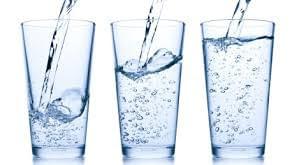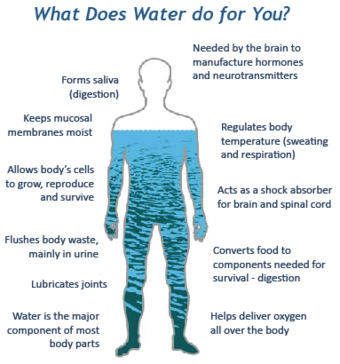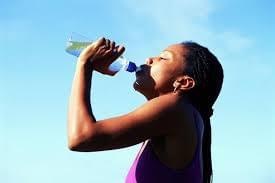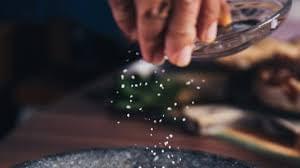
50-60% of our total body mass is water. FYI, men are a little higher on that average and women are typically a little lower. No surprise, but water is extremely critical for pretty much all of the functions that occur in the body at a cellular and organ based level.
Water in your body is divided into two major compartments; the intracellular fluid (inside the cell membrane) and extracellular fluid (outside of the cells), your blood fluid being a perfect example.
Your personalized nutrition plan includes a hydration target based on your particular goals.

As nutrition coaches, we are interested in how dehydration can impact human performance and weight loss. We know that a 1-2% dehydrated state can have a fairly large impact on performance in both endurance and strength based efforts. We also know that OVER-hydrating can have negative impacts on performance. In extreme cases, OVER-hydrating can actually be life-threatening.
A few years back, a study found that if you drank 500 mL (16 oz) of water, your body would use 24% more calories for 60 minutes after drinking water. The researchers figured that this was because of changes in osmolarity caused by drinking water and that your body has to expend energy to bring everything back in balance.
So not only is hydration important for performance but also body composition goals.
Should I Just Drink When I'm Thirsty?
One of the major questions that we get is whether you can trust your thirst level to judge when to drink more fluids. As is common in the nutrition world, the answer is "it depends."
Most of the time, your body doesn't generate a "thirst" response until about 1.5% of water is lost. Now if you're inactive, thats not a huge deal, but from an athletic performance point of view, its huge. Add on top of that the individual response to exercise ("sweater" vs. "non sweater") and making generalized statements about this topic is extremely difficult.
What Recommendations Can We Make?
The Institute for Medicine determined that an adequate intake for men is ~3 liters and ~2.2 liters for women. Of course, there's a bunch variables that could cause you to want to drink more (and sometimes less) than these amounts.
Another approach is to use your urine color as an indicator of hydration. Aiming for a goal of "slightly yellow" with ~5-6 urinations through a day seems to be a helpful goal for most people. Of course, supplements that have yellow coloring such a multivitamins, B vitamins, Turmeric, etc. can skew the urine color so just be aware of that when considering this approach.
What Should I Drink During Exercise?

In an ideal world, athletes should be drinking about 8-10 ounces of water 20-30 minutes prior to exercise with another 5-7 ounces for every 20-30 minutes of exercise that follows.
For longer efforts, adding some carbohydrates to the water can improve the absorption of water into the blood circulation, along with any electrolytes that are included as well.
All that said, most research indicates that exercise sessions lasting an hour or less are not negatively impacted by simply drinking water.
Should I Be Mixing Supplements Into My Water?

The answer again, it depends. Remember, everyone's a little different so ultimately your response to these approaches will be different as well. If you're hitting the target in your personalized plan and find that you're still struggling with symptoms of dehydration, then ask your coach about some recommendations. A very basic recommendation is to incorporate Himalayan salt into your water.
There is some evidence to show that a small dose (a pinch?) of Himalayan salt can help remove some of the burden we place on the adrenal glands through our day to day stresses. We personally keep the dose small and just do it for a single glass of water in the morning.
Final Thoughts
Hydration needs are very individual and are impacted by climate, activity level, and body chemistry. What's most important is that you hydrate prior to noticing a need to. Maintaining hydration can be as simple as including fruits, veggies, and a good amount of fresh water each day. Make it a goal to get on top of this early in your day by consuming 12 oz of water within your first hour of waking, and then at regular intervals throughout the day. If you're unclear as to how much you need, refer to your individualized recommendation and ask your coach. Hydration is key to achieving overall health, performance and body composition goals.




